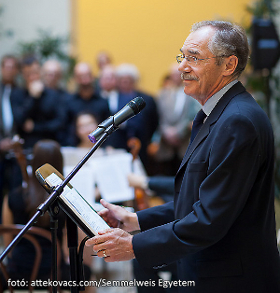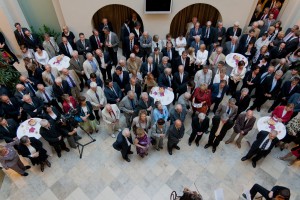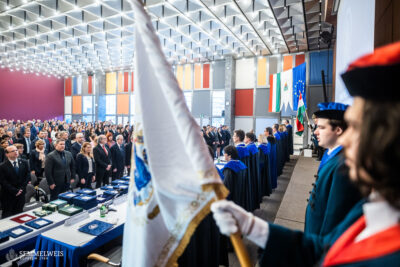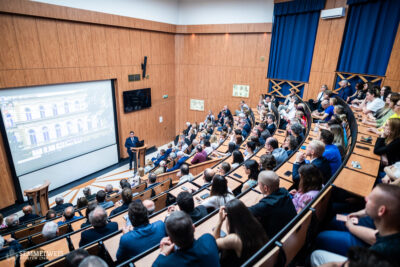 After nine years at the head of Semmelweis University, Dr. Tivadar Tulassay has stepped down from the rector’s post. “I look upon my friends and students with affection and gratitude, and have learned a lot from the dissenting opinions of those opposing me as well,” Rector Tulassay said at the farewell ceremony held in his honour. Quoting the acclaimed trumpet artist György Geiger, he exlaimed: “Dear trumpeters! To merely play the trumpet is not enough! Dear people! To merely live one’s life is not enough, and almost superfluous!”
After nine years at the head of Semmelweis University, Dr. Tivadar Tulassay has stepped down from the rector’s post. “I look upon my friends and students with affection and gratitude, and have learned a lot from the dissenting opinions of those opposing me as well,” Rector Tulassay said at the farewell ceremony held in his honour. Quoting the acclaimed trumpet artist György Geiger, he exlaimed: “Dear trumpeters! To merely play the trumpet is not enough! Dear people! To merely live one’s life is not enough, and almost superfluous!”
He recalled an assertion he had made nine years ago, something he has continued to abide by, even when these led to conflicts: that the University’s considerations override both personal interests and the interests of the narrower groups. “I have never given up my principles for perceived benefits,” he declared.
He emphasized that the successes of the past nine years are not solely his achievements, but those of the team who worked with him as well. Dr. Tulassay listed the fact that the University’s reputation and respectability have stabilised at a permanently high level, the earning of the “Research University” title and the strengthened international presence of the University among the most significant achievements. Further to the latter, Rector Tulassay noted that the international students, who arrive from over sixty nations around the world, bring almost as much revenue to the University as the amount of state funding provided to support the Hungarian students. Equally important is the fact that, in spite of prolonged recession and shrinking resources, numerous infrastructural investments have been made over the last few years; by restoring its buildings to their original splendour, the University has undertaken a cultural mission as well.
 Dr. Tulassay considers one of the greatest achievements of the recent past to be that the University has been able to identify its most talented students, and to nurture and shape their future career paths within the framework of the Ödön Kerpel-Fronius Talent Support Programme. “Outstandingly talented individuals mean the future of both the University and the nation as a whole,” Rector Tulassay commented.
Dr. Tulassay considers one of the greatest achievements of the recent past to be that the University has been able to identify its most talented students, and to nurture and shape their future career paths within the framework of the Ödön Kerpel-Fronius Talent Support Programme. “Outstandingly talented individuals mean the future of both the University and the nation as a whole,” Rector Tulassay commented.
In his speech, he mentioned that he considers university autonomy to be the most important guiding principle because, in his opinion, only this will be truly beneficial in the long run.
Dr. Tulassay ended his speech as he had started it: with a quote from the Letters of Paul the Apostle: “Non est volentis, neque currentis, sed miserentis Dei” which, in the King James Version, reads: “So then it is not of him that willeth, nor of him that runneth, but of God that sheweth mercy.”
Szilvia Tóth-Szabó
Translated by Gina Gönczi


